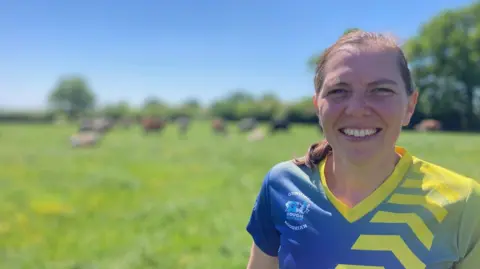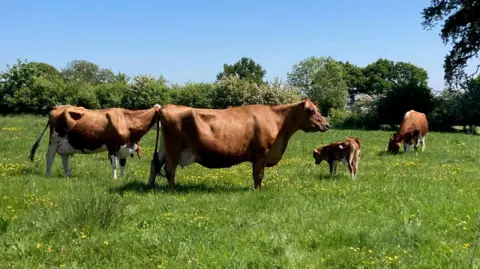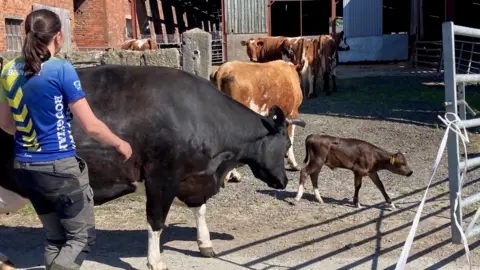Farmer fights to save 'cow and calf’ dairy
 BBC
BBCA dairy farmer who switched from a conventional way of milking to a holistic one says it is more rewarding.
The calves at Babbinswood Farm near Oswestry, in north Shropshire, stay with their mothers until they are weaned at up to eight months old, instead of being separated hours or days after they are born.
However, farmer Casha Bowles-Jones said her "cow and calf" dairy could be at risk unless she could raise money by selling some of the land to the community.
A change in personal circumstances has meant that half the value of the farm is up for sale. They need to raise £1.5m by September.

Five generations of the Bowles-Jones family have farmed at Babbinswood.
In 2002 it converted to organic, and then 15 years later, after completing a course in holistic management, mother and daughter, Barbara and Casha, adopted the cow and calf or cow with calf method.
Veterinarian Barbara said they started with one rescue cow and have built up to a herd of 80 dairy cows. "We wanted to do it in the most compassionate way possible," she said.
"The farm milks once a day", instead of the conventional two, "and the cows share their milk between us and their babies."
Casha said: "I'm a mother, and knowing the cows have been kept in a way that really resonates with the way I feel a mother should bring up her child - to me that's just natural and what we're trying to replicate here."
A litre of milk is more expensive to produce from a suckled dairy system, as the calf is getting a share of the milk, so the yields are lower. Casha estimates her cows produce, on average, around eight to 10 litres a day compared to 25 to 30 litres on conventional dairy farms.
This means the milk is more expensive and considered more of a luxury product. A litre of milk from the farm costs £3, plus a refundable deposit on the glass bottle, compared to around £1.40 in supermarkets.
The milk is pasteurised on site and sold in the farm shop and is also delivered to customers.
Four months to raise £1.5m
This way of farming could come to an end due to a change in family circumstances, and half the value of the farm is up for sale.
The family has formed the Babbinswood Farm Community Benefit Society (CBS) to buy 116 acres of the 176-acre farm and put the land into community ownership.
A crowdfunder has been set up for anyone who wants to buy shares and make donations.
CBS director Charlotte Hollins said: "Not only do we want to retain this way of farming for Casha, but also for the community to have a part in it."

Cow and calf farming methods are more commonplace in other parts of the world, including Nordic countries as well as Mexico and Australia, according to farming consultant Anna Bowen.
She said it was not unusual to find cow and calf milk being sold in supermarkets abroad and hopes the same may happen in the UK one day.
The National Farmers Union said it "celebrates the diverse range of production systems and those farmers who are busy meeting shoppers demands for milk and dairy products".
NFU Shropshire county adviser Ed Garratt said: "While farmers decide how they want to farm, they all have things in common, including a real love for the job, pride in growing food, a deep sense of care for their animals and a commitment to producing the best produce to the highest standards while looking after the countryside.
Farmer Rob Davies, NFU Midlands dairy board chairman, said: "Our high animal welfare and production standards are recognised the world over and are hugely valued by shoppers, who recognise choosing British dairy means eating high-quality sustainable food."
Follow BBC Shropshire on BBC Sounds, Facebook, X and Instagram.
